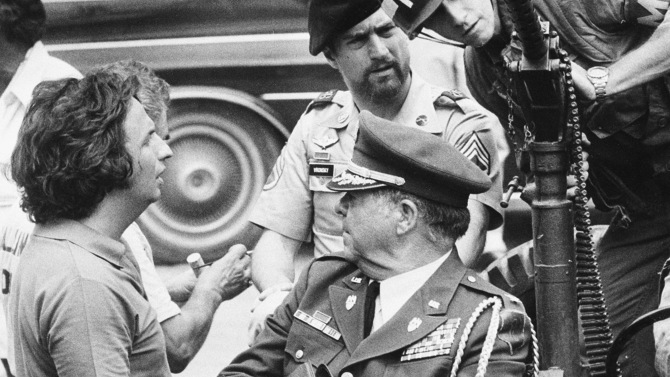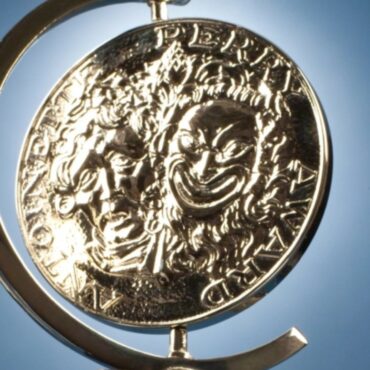chevron_left
-
play_arrow
NGradio So good... like you
share
close
It’s easy to think of the 1970s as a time of things falling apart. The counterculture was still doing its slow-burn flameout, and most of the decade lingered under the twin shadows of Vietnam and Watergate, which together blew a hole in our collective sense of faith. The great American filmmakers of the era — directors like Coppola, Scorsese, Altman — responded by holding a mirror up to our doubt and alienation. Yet as dark as some of their movies could be, the New Hollywood was never about tearing things down. It was about looking at the place that America had become and seeing it as something stirring and redemptive, tragic and effusive, intimate and grand. It was about picking up the pieces of a broken but still exhilarating landscape and finding, within them, a new kind of American dream.
When it came to that mission, no filmmaker of his time dreamed bigger than Michael Cimino. He didn’t just want to tell stories. He wanted to tell the story — the mythical big story, the one about the spirit that made America what it was. One of his films, “The Deer Hunter,” is a classic of its time. Another one of them, “Heaven’s Gate,” is famous for being the disaster of its time. Yet when you consider the qualities of each movie, there’s now something poetic in thinking of them together. Cimino seized audiences by dreaming big and then, high on what he’d accomplished, he pushed himself to dream too big. There was a crazy majesty woven into the very fabric of his ambition.
If you go back and watch the very first film that he directed, “Thunderbolt and Lightfoot” (and I highly recommend that you do), you’ll see that it’s an early version of a buddy movie, and still one of the most captivatingly authentic buddy movies ever made. Jeff Bridges, as the eager boyish thief Lightfoot, and Clint Eastwood, as the irascible bank robber known as The Thunderbolt, keep trying to taunt and one-up each other, and they’re sometimes dryly funny (especially Clint), but there’s no shtick, no formula to their connection; they’re disreputable outlaws who’ve simply stumbled into each other’s company. The movie turns into a heist caper, but a loose, unkempt one, and by the end you feel you’re watching a film that blends the ebullience of “Butch Cassidy and the Sundance Kid” with the gravitas of “Midnight Cowboy.” It’s a beautiful piece of shaggy neorealist genre filmmaking, and it suggests a whole career trajectory that Cimino might have chosen that would have been very different — almost a parallel reality — to what he did. If he’d simply decided to be, you know, an entertainer, he could have been an amazing one. He had the chops and the daring.
What he didn’t have, perhaps, was the throwaway spirit. “Thunderbolt and Lightfoot” was released in May, 1974, two months before Richard Nixon’s resignation, and it marked Cimino as the first major filmmaker who was part of the New Hollywood who actually came up through it; to a large degree, he was formed by it. He’d written the script for the second Dirty Harry film, “Magnum Force,” and it was his association with Eastwood that launched him as a director, but as soon he found success, he decided that he didn’t want to make anything resembling a fun-and-games genre film. He wanted to tell the story of the war that had torn us apart.
“The Deer Hunter” wasn’t the first movie to confront Vietnam (technically, that was the B-movie revenge thriller “Rolling Thunder”). It wasn’t even the first to confront the cataclysm of soldiers returning after the war (that would be “Coming Home,” which beat it to the punch by 10 months). And once “Apocalypse Now” came out (and “Platoon” and “Full Metal Jacket” seven and eight years later), it would not be the Vietnam film that defined the combat experience. But “The Deer Hunter” was the first film — and still the greatest — to take the full measure of how the toll of Vietnam damaged, and changed, the soul of America. Cimino, born in 1939, grew up going to private schools on Long Island, but he chafed and rebelled against his privileged background, and with “The Deer Hunter” he dove so deep into the lives of a crew of Russian-American Pennsylvania steelworkers that it was as if Hollywood had finally discovered what an essential gritty swath of mainstream America actually looked like.
These were the people that the movies usually ignored, but they were the people who fought in Vietnam, while upper-middle-class kids mostly got out of serving (and won most of the attention for doing so), and Cimino was going to do them justice. Robert De Niro, as the title character, acted with a stoic, mournful hush that embodied, almost mythologically, what the country had once been: a land of straight shooters. And then he landed in ‘Nam, where those rules suddenly didn’t apply. “The Deer Hunter” is an epic drama of work and family, a cataclysmic tale of combat and coming home, and, in the famous Russian Roulette sequences (which are not a representation of what actually went on in the backalleys of Vietnam — more like an impressionistic nightmare version), it is even a squalidly terrifying comic-book action film. What makes the movie indelible is the way it touches such an endlessly deep nerve of loss. For moviegoers in 1978 and 1979, the film became a kind of reckoning, a catharsis that helped to ease us, as a nation, past the raw wound left by the war. There were films made in the ’70s that were greater (“The Godfather,” “Taxi Driver,” “Nashville”), but there was no better example than “The Deer Hunter” of what it looked and felt like when a movie mattered.
And then came the movie that ended it all — not just the New Hollywood, but Cimino’s career. There are many lessons, in hindsight, that can be extracted from the debacle that was “Heaven’s Gate,” and the first of them may simply be this: No movie — not Abel Gance’s “Napoleon,” not “Doctor Zhivago,” not Cimino’s droolingly awaited follow-up to “The Deer Hunter” — should be three hours and 39 minutes long. Especially if that film is an aridly spectacular pictorial ramble of a Marxist Western in which the astonishing authenticity of the scenery and the sets threatens to overshadow the people who are acting in front of them. Had “Heaven’s Gate” been a shorter and more disciplined movie, rather than what it basically is, which is a rough cut masquerading as a finished product, it might still have been a financial sinkhole that brought down an entire movie studio, United Artists. But it might not have been perceived as a movie that wore its indulgence on its brocaded Old West sleeve.
As a piece of storytelling, the film was no “Deer Hunter,” yet there was a gorgeous violent ethereal grandiosity to it. On the set, beginning in April, 1979 (when shooting commenced), it had become Cimino’s version of a Stanley Kubrick film: endless retakes, an attention to detail that crossed from the meticulous into the madly obsessive, all driven by a director who believed in his vision with such intensity that it gave him a kind of carte blanche. And according to the New Hollywood system that had not yet been brought down, carte blanche is just what he had. It’s said that Cimino yearned to shoot over a million feet of footage, so that he could top Coppola’s record from “Apocalypse Now” — and, indeed, “Apocalypse Now,” released to theaters in the summer of 1979, was proof that a film could take years to finish, and look as if it might be the ultimate act of directorial indulgence, and still come out as a great movie, and a major hit besides. In “Heaven’s Gate,” the money was on the screen (most astoundingly in the misty-mountain sweep of Vilmos Zsigmond’s cinematography), but the raw power was not.
Was it Cimino’s fault? Yes and no. It’s telling that “Final Cut,” the famous book about the making of “Heaven’s Gate” written by Steven Bach, the UA senior vice-president and head of worldwide productions who was intimately involved with overseeing the production, had all the drama and suspense that the film itself did not. The most incisive comment about Final Cut came from Pauline Kael, who admired the book but described Bach as trying, in vain, to figure out the problem that was endlessly protracting the shooting of “Heaven’s Gate,” never fully realizing that he was the problem. It was his job to bring the hammer down. Searching for poetry in the hills of Wyoming — that was Cimino’s job.
Some now argue that he did it brilliantly. After it was shown in several different crudely truncated versions, the rehabilitation of “Heaven’s Gate” began with presentations of the full-length version on the Z Channel in Los Angeles, where it began to acquire a cult of followers. There is now a whole school of critical thought that says the movie was an underappreciated masterpiece. I would argue that what’s really changed is that “Heaven’s Gate” is now regarded by some as a postmodern art film: “McCabe & Mrs. Miller” meets Béla Tarr. But is it worth another look? No doubt. If only to see the last embers of the New Hollywood as lit by the pure flame of Michael Cimino’s indulgence.
It’s sad to say that Cimino was never the same, because even in sequences of “Heaven’s Gate,” like some of its stunning battles, he’s a wizardly filmmaker. But the Cimino who returned to directing after a five-year break was a different artist — diminished, perhaps, by his ordeal, but also by the new world order of 1980s Hollywood, in which filmmakers were now closer to being hired hands. “Year of the Dragon,” Cimino’s messy, entertaining sprawl of a drama about cops and triads in New York City’s Chinatown, had the good fortune to feature Mickey Rourke when he was at the peak of his charisma, as well as an Oliver Stone script that peered, ahead of the curve, into the ways and rituals of Asian-American crime culture. Yet as intensely watchable as the film was, it wound up coming off like second-drawer Sidney Lumet. It was a good step back to the center of things for Cimino to take, but he never took the next step. In his last films (the moribund “Godfather” knockoff “The Sicilian,” the robotic noir “Desperate Hours,” the dismal “Sunchaser”), it was clear that he had lost his juice for filmmaking. We can only speculate as to what private demons may have gotten in the way.
But maybe Michael Cimino couldn’t adapt to the new era because he simply didn’t want to. He didn’t want to be a hired hand, a cog in someone else’s moviemaking machinery. He had come up in the decade when his imagination could be the heart and soul of the machine, and thinking back to the movies he made — to the greatness of “The Deer Hunter,” and to “Heaven’s Gate,” in which he lunged so hard for greatness that the grandeur of his overreach became the film’s very subject — one can’t help but be awed by the singular audacity of a filmmaker who dreamed so big and, in daring to think of himself as a giant, became one.
Source: variety.com
Written by: New Generation Radio
Rate it
Similar posts
ΔΗΜΟΦΙΛΗ ΑΡΘΡΑ
COPYRIGHT 2020. NGRADIO





















Post comments (0)